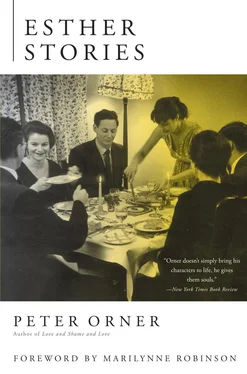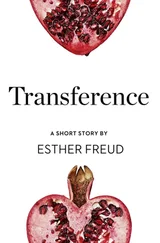If it is true what my grandmother says — that our boxes of family pictures lie like her cousin Ubby, the harness racetrack owner from Pittsburgh — then you should be able to tell they are frauds just by looking at them. But you can’t. And who is to say, without the interference of hindsight, that Esther and Lloyd’s early marriage wasn’t a happy one? Esther moved back to Chicago from Champaign and into Lloyd’s apartment on 1 East Schiller on the North Side. Years in my family are often identified by streets: Lunt Avenue, Rogers Park. Pine Point Drive, the first house in the suburbs. In the 1 East Schiller photographs—1963 through 1965—Lloyd and Esther are attached, tangled, cheek to cheek. Their grins are smelted together to form one happy gaping mouth. (My grandfather likes to take close-ups of his subjects’ faces. Backgrounds have never interested him.) To me, the smiles aren’t haunting. They’re beautiful, naive smiles that have no way of knowing what’s to come. They make me love them. The them they were in 1963 and the them they became. Maybe it’s because the pictures are only of their faces. No rooms. No houses. No familiar trees to link them to their longer story. Esther’s compact little face and Lloyd’s awkward tilt toward her. He was so much taller. Two smiling, bobbing apple—colored blushing cheeks.
I cannot — as my grandmother does — scoff. I refuse to see only the bitterness of later. I should have known. We should have known. Seymour said he didn’t like something he saw, but who ever took what he said for a grain of anything. But just because I know genuine joy when I see it photographed doesn’t mean I can’t see, even at this early stage, what Esther’s trying to do with her eyes. In every picture from that period Esther is looking straight at the camera, smiling with Lloyd but also entreating her father, my grandfather, the ubiquitous cameraman, to see her. I say that was the problem in those years. She let people look but not see her. Her parents, her parents’ friends, her sorority sisters, her husband. Except for those moments — caught on film and now stored in a box in the basement — when she can be seen begging her father to put the camera down and look at her and just say, Esther.
Not a letter opener she attacked him with but a butter knife — a blunt, rounded, harmless knife for slicing butter is what my grandmother says. Olivia insists it was a letter opener. Take your pick. What matters is Esther chasing Lloyd around the apartment screaming and finally cornering him in the shower stall. Pushing, digging the blade — whichever blade — into his shoulder as he crouched. Ripping his shirt and then his flesh. Lloyd not fighting her because he never, even then, refused her touch.
Oh! I tell you! Olivia shouted. Nothing was bigger in that house than when Esther was expecting and the celebrating was going on. Mattie Rosenthaler, and all your nana’s other friends, too, brought over enormous boxes of presents from Field’s, and your nana couldn’t stop rubbing her hands. What could be better to cure what people called Esther’s restlessness than a baby? Everybody shopped and shopped, and Esther glowed like a little pink peach, like she did in high school when she won Homecoming Queen and rode the float through town. All of us smiling in front of your grandpapa’s bank, and we waved and she waved. When she was pregnant she’d take the train out from the city and rub her belly, and I remember her saying, Ollie, do you believe it? Can you believe I’m the swelly-belly girl! And I cried and said, Esther, I love you, honey. You’ve got to take care of yourself now. Because even then, even though that girl was happier than she ever was, she was starting to doubt things. She’d say things like Lloyd doesn’t love me and he never has. Course I knew that wasn’t the problem ever. Oh, did I know that wasn’t it! Lloyd loved her like you’ve never seen. She didn’t want to be her. Makes no sense in a girl so beautiful, but it’s true. So beautiful that people used to stop the carriage when she was a baby. We’d be walking along and people would shout and point and say, Would you look at that angel. An angel on earth. But when she got older Esther used to stand in front of the mirror and stare and stare at herself as if she could change what she’d been given just by looking.
My parents were out of town, so we were sleeping at my grandparents’. I must have been eight or nine, my brother around four. It was late and I was tiptoeing across the cold tile of the big kitchen on my way to Olivia’s room, and the cats. I liked to sleep with Olivia, my face in a soft cat belly, my feet rubbing Olivia’s tough bony ankles. I had almost made it to Olivia’s door when someone sniffed. I turned and looked. It was Esther. It must have been sometime in 1968, because she had no stomach anymore. When I tried to sneak by, she stopped me. I looked at her again and, in the weak light of the driveway lamp, saw that she was wearing only a towel.
“Leo?”
“Uh-huh.”
She was eating cold spaghetti. She put her fork in the bowl. “I want to tell you something your mother’s not going to tell you.”
“Okay.”
“And I want you not to forget.”
“I won’t.”
“You’re going to sleep with Olivia?”
“Just to say hi to the cats.”
“If I tell you something, will you remember it?”
“Okay.”
Even in that low light I could see that her eyes were red and she was more beautiful than my mother.
“I’m going to be honest with you.”
“Okay.”
“You pay.” She stared at me. “You pay for everything. When you think you’re getting something for free — remember this — you’ll pay for it later.” She put her bowl down on the counter and came closer, knelt down. Her breath was hot. The driveway light was in her hair. “Please don’t forget this, and don’t let anybody, especially a pretty Miss Muffet, tell you I lied to you.” Then she held my arms for about a minute before she laughed a little and said, “You can laugh in this house. Even when Olivia’s not around to make jokes. You are allowed to laugh.”
My younger brother, Alex, remembers little about Esther. But he thought about it for a while and then said, “I spent one day with her in my entire life. I must have been six or something. Mom brought us downtown because you had to go to the doctor’s or the barber. For some reason she dropped me off at Esther’s apartment. Uncle Lloyd wasn’t home. It was a Saturday. She took me to the Shedd Aquarium to see the electric eels. Then we went to a park. Grant probably. She chased me around. We played horses. She got down on her knees and neighed. She let me climb a tree also. I remember that. And she didn’t tell me to be careful. She just let me climb. Then she took me to Granny Goodfox on Wells Street and bought me a felt puppet, a cow. In the car on the way home, Mom named it ‘Bossy.’ I remember you kept swinging it around by its ear out the window until Mom told you to cut it out.”
Her baby was born dead on February 10, 1968. They named her Frances after some great-grandmother of Lloyd’s and buried her at the Burman plot in Memorial Park in Skokie. For the first six months after it happened, my grandmother slept on a cot at Esther and Lloyd’s apartment. Either that or Esther stayed at Pine Point. My grandmother told me many years later that at first Lloyd resisted, but later tolerated her presence, because at least when she was around Esther stopped her terrible moaning. In that same conversation I asked, Did Esther really want to be a mother? I mean, given everything you know now, do you think she would have been able to handle it? We were sitting at her kitchen table. This was last year. My grandmother glared, but not at me, somewhere off to her left, as if somebody else, not me, had spoken. Then she said, “What kind of question is that? Don’t get so big, Mr. Toots, that you stop being able to understand that that baby would have rescued everybody.”
Читать дальше












